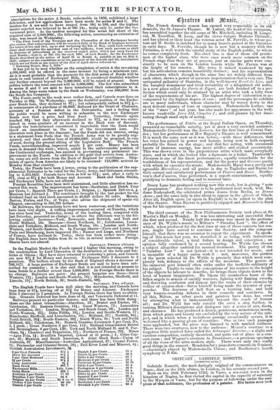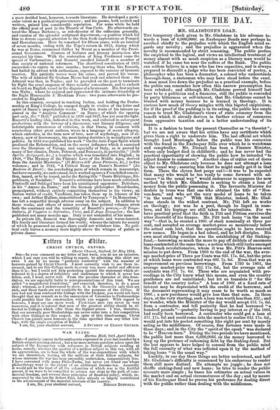OBITUARY: GABRIELE ROSSETTI.
[COICKENICATED.]
Gabriele Rossetti, the most daringly original of the commentators on Dante, died on the 26th ultimo, in London, in his seventy-second year.
Born on the 28th February 1783, in Vast°, a sea-coast town in the kingdom of Naples, he first visited the capital in the capacity of secretary to the Marquis of Vasto, but for the purpose of following, under the aus- pices of that nobleman, the profession of a painter. His tastes soon took a more decided bent, however, towards literature. He developed a parti- cular talent as a poetical improvvieatore ; and his poems, both recited and written, gained him considerable reputation. For some while he held the oifioial post of poet to the Theatre of San Carlo. He afterwards en- tered the Museo Borbonico, as sub-director of the collection generally, and curator of the splendid sculptural department,—a position which led him to devote especial attention to the then fresh explorations at Pompeii and Herculaneum. Here he remained for fifteen years, with an interval of seven months, ending with the Pope's return in 1813, during which he was at Rome, summoned thither by Murat as a member of the Provi- sional Government. Courses of lectures and literary instruction also occupied his time. With the restoration of Ring Ferdinand came the spread of Carbonarism ; and Rossetti enrolled himself as a member of that society of national reformers. The shortlived constitution of 1821 succeeded—to expire in nine months ; leaving those who, like Rossetti, had hailed its advent with enthusiasm, exposed to the rancour of tyrannic reaction. His patriotic verses were his crime, and proved his rescue. The wife of Admiral Sir Graham Moore had read and admired them : the Admiral was then in Naples; and he prevailed on the poet to terminate by flight the cruel suspense of three months' concealment, and to embark on board an English vessel in the disguise of a lieutenant. His first asylum was Malta ; where he enjoyed and appreciated the intimate friendship of the Right Honourable J. Hookham Frere : two years afterwards ho pro- ceeded to England. In this country, occupied in teaching Italian, and holding the Profes- sorship at King's College, he engaged deeply in studies of the letter and spirit of Dante's imperishable works. The first fruits of his labours ap- peared in the "Analytic Comment" on Dante ; of which the opening part only, the " Hell," published in 1826 and 1827, has yet seen the light. Rossetti's leading idea, indicated in this work, and enforced in subsequent productions with the fervour of a discoverer, vast literary diligence, and indefatigable minuteness of criticism, is that Dante, in common with numberless other great authors, wrote in a language of secret allegory, which embodies, in the form now of love, now of mythology, now of al- chemy, now of freemasonry, the most daring doctrines in metaphysics and politics. In 1832 was published his work " On the Anti-Papal Spirit which produced the Reformation, and on the secret influence which it exercised over the literature of Europe, and especially of Italy, as is proved by many of her classics, Dante, Petrarch, and Boccaccio, in particular," (Sub Spirits) Antipapale, &c.,) a treatise which was translated into English ; in 1840, " The Mystery of the Platonic Love of the Middle Ages, derived from the Ancient Mysteries," (B Mister° dell' Amor .Platonico, &c.,) in five volumes ; and in 1842, "A Critical Essay on Dante's Beatrice" (La Beatrice di _Dante); the concluding parts of which remain in manuscript, buthave recently, we understand, been worked upinto a Frenchified concoc- tion, issued, or to be issued, under the flaring title "Dante Heretique,.Re- publicain et Socialiste." Rossetti's criticisms have been much criticized. Fraticed and Schlegel have been his unmitigated opponents : Delecluze, in his "Amour du Dante," and the German philosopher Mendelssohn, promulgated, without entirely committing themselves to his views ; an Italian writer of credit, Vecchionii has taken them up in labours of his own ; and Arthur Hallam, immortalized by Tennyson's " In Memoriam," has left a respectful though adverse essay on the subject. In addition to these works, and others of minor account, four poetical volumes attest both the constancy and the versatility of Rossetti's powers,—R Tempo- Suiten°, B Veggente in Solitudine, Versi, and L'Arpa Evangelica ; the last published not many months ago. Italy is not unmindful of his name.
In private life, Rossetti was thoroughly domestic and warm-hearted. His family and literature formed his world ; whence the talents for society of which lie possessed an ample share could not withdraw him. No poli- tical exile leaves a memory more highly above the whisper of public or private shame.



























 Previous page
Previous page